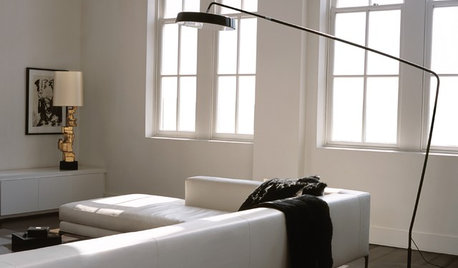Oversized by SEER or # of Tons?
pagardenguy
13 years ago
Related Stories

KITCHEN DESIGN7 Magnificent Oversize Backsplashes
They go up to the ceiling and don’t fall short on making a major impact. Are you ready to hop on the big-backsplash bandwagon?
Full Story
LANDSCAPE DESIGNRoll With Boulders for High Landscape Impact
Go for big-league drama outdoors with oversize rocks in gardens, around pools and on patios
Full Story
MODERN HOMESHouzz Tour: Desert Home Blurs Every Line Between Indoors and Out
Expansive windows, oversize doors, skylights, a covered patio, an atrium and a roof deck make the most of beautiful surroundings
Full Story
DECORATING GUIDESThe Faces Have It: Large Portraits Go Over Big
Oversize visages of celebrities and mere mortals make for double-take drama in interiors
Full Story
ECLECTIC STYLEMy Houzz: Thrifted Finds Invigorate a Montreal Artist Couple's Loft
It has a factory past, but this Canadian home's creative look is anything but assembly line
Full Story
SHOP HOUZZShop Houzz: How to Decorate an Open-Plan Space
Give yourself some breathing room with a flowing, open furniture layout
Full Story
Guest Picks: Assemble a Summer Rental Survival Kit
Cover up sketchy furniture and floors, add cheery decorations and set a beautiful table in a bare-bones summer rental home
Full Story
HOUZZ TOURSMy Houzz: Whimsical, Flirty Style for a Designer’s Brooklyn Studio
A love of vintage items, travel and dinosaurs adds dramatic flair to this New York apartment
Full Story









weedmeister
maryland_irisman
Related Professionals
Phoenix Solar Energy Systems · Champlin Solar Energy Systems · Greenwich Solar Energy Systems · Lakeville Solar Energy Systems · Wasco Solar Energy Systems · South Whittier Home Automation & Home Media · Fayetteville Home Automation & Home Media · Hacienda Heights Home Automation & Home Media · Libertyville Home Automation & Home Media · Manhattan Home Automation & Home Media · Norridge Home Automation & Home Media · Plant City Home Automation & Home Media · San Marino Home Automation & Home Media · Robbinsdale Home Automation & Home Media · Elgin Fireplacesjuliekcmo
pagardenguyOriginal Author
neohioheatpump
maryland_irisman
baymee
juliekcmo
veesubotee
pagardenguyOriginal Author
tigerdunes
juliekcmo
tmgeorgo